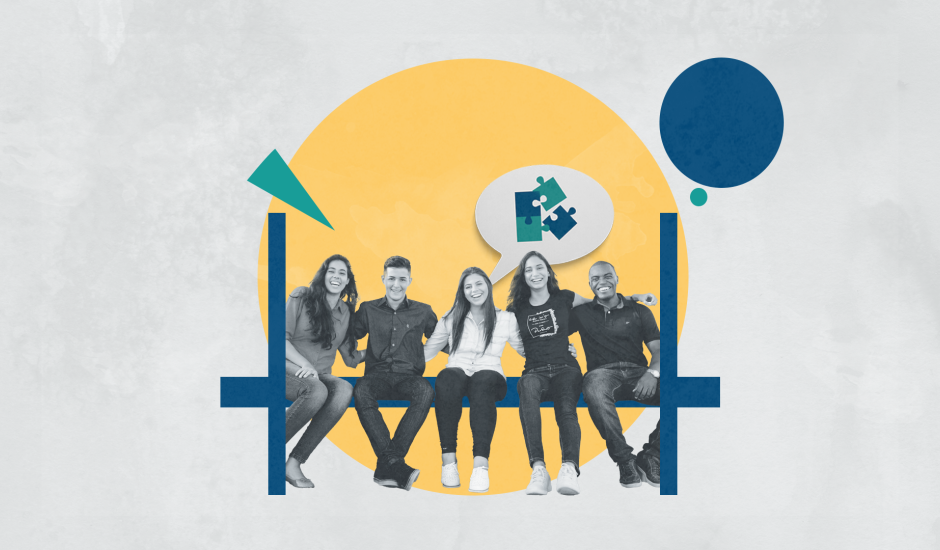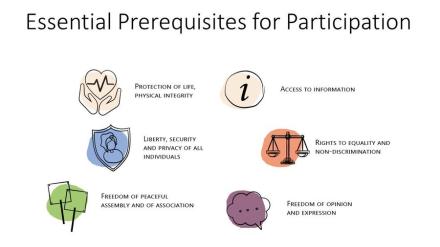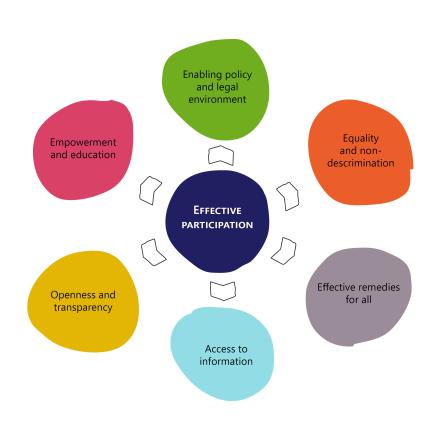Participation
Participation allows the public to become empowered as drivers of change, as opposed to being viewed as passive recipients of decisions affecting them. Participation plays a crucial role in the promotion of democracy, the rule of law, social inclusion and fair economic development. It builds trust in the institutions and decisions that influence public life.
But we can only achieve free and meaningful participation if states guarantee an enabling policy and legal environment: when the space for civil society is closing and more restrictive, it cannot effectively participate in public decision making. This, in turn, decreases the legitimacy of states’ decisions, making them less transparent and less informed.
Participation is also central for empowering marginalized and vulnerable individuals and groups. It is essential that their voices, their specific needs and particular solutions are heard and considered when decisions are made about them. This helps to prevent further marginalization and discrimination, and to equal the playing field for underrepresented groups, thereby contributing to closing the gap with the rest of the society.
Finally, a broad participatory effort is also essential for realizing Sustainable Development Goals, and especially for reducing inequalities and social conflict.
ECNL has developed a 3-pronged approach to address these issues:
Generating and sharing knowledge: we are identifying, synthesizing and understanding the trends and core issues around participation. This is key to create good policies, laws and practices, and push back on restrictions. Find out more about our EU-funded "ParticipatiON" project.
Reform and Standard Setting: we contribute actively to strong international (UN), regional (Council of Europe and the EU) and national standards and regulation that can safeguard and promote the right to participation, give guidance, change narratives and disrupt systems that limit civic action.
Empowerment and mobilisation: we help raise awareness and share learnings, alert and connect organisations, activists and movements to empower their actions in public decision-making processes. In that way we connect standard setting with direct implementation of the public participation right and mechanisms on national level.
We want governments to normalize meaningful civic participation before, during and after political decision making by fully and transparently implementing the right to participate. For that to happen, we need:
- Openness and transparency of public decision-making processes;
- Concrete and thorough mechanisms on global, regional and national level that allow for public participation, both online and offline;
- Participatory mechanisms that are accessible and inclusive to all, including marginalized individuals and groups;
- Enabling policy and legal environment for free association, assembly and expression;
- Unobstructed and timely access to information, which are proactively disseminated, accessible, clear, and practical;
- Financial and human resources and support for participation;
- Media education and digital literacy programmes for general public, civil society and officials.
We also have the right to participation in times of emergencies. Indeed, inclusive decision making is crucial for response measures to address actual needs and not to affect people disproportionately. We have seen that many countries have in fact devised and started using new platforms or mechanisms to engage with the public in order to seek input on government plans. This way they can better respond the Covid-19 pandemic crisis and reduce its negative impact. We strongly believe that such openings for civil society and the public at large to join forces with different sectors should be seized to turn ad-hoc engagements into meaningful, long-term and systematic participation.
- We don’t want to be sued into silence: Op-ed by 87 NGOs, including ECNL, calling on the EU to have anti-SLAPP rules in place across the EU to ensure those with a watchdog role are protected from gag lawsuits.


